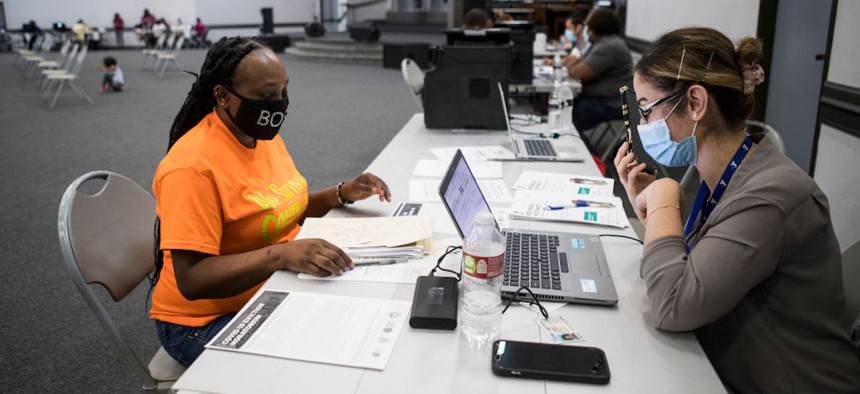Why tenants struggle more in the wake of hurricanes

Danielle Hampton, left, helps a resident apply for the Houston-Harris County Emergency Rental Assistance Program at Harvest Time Church on June 30, 2021, in Houston, Texas. Brett Coomer/Houston Chronicle via Getty Images
Eviction filings and threats of eviction tend to increase after hurricanes, which experts say could be fueling housing instability and displacement in the wake of disasters.
This story is republished from Grist. Read the original article, which was supported by the Economic Hardship Reporting Project.
When hurricanes hit, it’s easy to show the damage: downed power lines, uprooted trees and destroyed houses. But when those things are removed or cleaned up, there is a more insidious damage that still lurks and is hard to portray: lack of affordable housing.
And that hits renters in the coastal United States especially hard, according to new research from Ohio State University.
The study looks into how affordable rent is in the wake of hurricanes, weather disasters that are becoming more common due to climate change. Researchers found that after a hurricane, the number of rental units usually decreases, which leads to higher rent prices. Some states, like Florida, actually have a moratorium on rent increases after disasters — but it only lasts for a month. Meanwhile, the damages from hurricanes can sometimes take years to repair. Other research backs that up, with one study from 2022 finding that 40 percent of rental units are in the path of disaster.
The trouble often comes because tenants are vulnerable in a multitude of ways, according to Kelsea Best, lead author and a professor of civil and environmental engineering at Ohio State University. Specifically, renters are contending with the “overlapping crises of housing affordability and climate-related disasters in the United States.”
Another finding from the researchers: Both eviction filings and threats of eviction went up in the wake of hurricanes, which could be fueling housing instability and displacement in the wake of disasters.
Best also noted that the damage brought on by climate-related disasters can speed up gentrification and displace renters, especially those who are low-income.
Currently, renters aren’t protected by the same federal programs that protect homeowners in the wake of disasters. They can’t access the same cash grants, or be compensated fully for their items by the government since often renters don’t have receipts or a clear accounting of all of their items and how much they are worth the way that homeowners do.
“Our disaster safety net in this country has always prioritized property,” said Carlos Martín, project director at the Joint Center for Housing Studies at Harvard University. “We assess what you’re due in the safety net program based on damages to your property.”
The steps that both disaster management agencies and local governments take before a disaster can often be just as important, protecting tenants from rising rents and eviction post-disaster, according to Martín. He emphasized that to ensure renters don’t experience housing instability or are pushed into homelessness, that municipalities and the federal government need to invest in affordable housing, “before the disaster hits.”
If aid does come to renters, they are often still stuck waiting for properties to be rebuilt.
“It takes a lot longer to build rental housing, aka a multifamily unit, than it does to rebuild a single family property,” said Martín. He noted that rental housing often takes four or five years to rebuild — the longest compared to other forms of housing of a similar size. By then, renters would have long moved on to other places or properties.
“There’s so many ways that renters are screwed,” said Martín.
But solutions to the problem do exist, and Martín suggests looking to the recent past to enact some of these policies. The most notable ones being eviction moratoriums and rent relief enacted at the start of the COVID-19 pandemic. These policies, created to accommodate a global pandemic, have resonance as a way to protect renters from the financial burden of climate change, a crisis in which costs are already in the billions of dollars per year and are only expected to go up.
Best suggests earmarking funding specifically for renters in the wake of disaster. In addition, she agreed that rental protections like the ones Martín and his team looked into are crucial, not just in the immediate aftermath of a disaster but in the months and years after a disaster hits.
In the meantime, the country can go a long way to work on its housing availability and affordability, which is hitting low-income Americans the hardest.
“We have this really severe shortage of affordable, safe rental housing and these effects of climate change and climate related disasters are just going to become more frequent and intense,” said Best.





